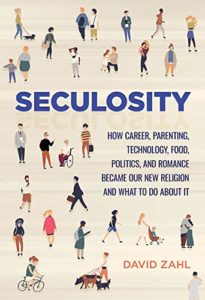From Five Books.com:
Oliver Burkeman, the Guardian columnist and author of The Antidote, recommends five of the best self-help books published in 2019.
Perhaps what we were saying a moment ago about busyness could lead us to your second self-help book choice, which is Seculosity by David Zahl which you called “remarkable” in the Guardian. Could you tell us more?
It surprised me how much I got from this book, because it is – in a very low-key, not in your face way – a Christian work, and I’m not a Christian. David Zahl’s basic argument is that this idea that we’re not religious these days is mistaken; we’ve just transferred our religious urges onto things other than conventional organized religion. What he means by that is that we’re seeking salvation of some sort in work, in shopping, in the cultivation and creation of identities online, in parenting, in foodie culture and a whole bunch of other domains. We seek transcendent meaning from secular sources. ‘Seculosity’ is religiosity applied to the secular world.
I think he makes a really good argument from a Christian perspective: that religion has many, many flaws, but it has built into it a capacity for forgiveness that our other modern secular ‘religions’ don’t. This is the quality that he would call ‘grace’ – the idea that you are worthy, and acceptable, despite, perhaps almost because of, your flaws. That you don’t need to deserve God’s love, by meeting some kind of level of accomplishment or virtue, in order to have it. That’s very much not true when it comes to seeking salvation through, say, your work; there, you really do have to meet specific criteria to count as worthy, and you’ll probably find that the bar you’re supposed to meet keeps rising the closer you get to it.
“You might be seeking salvation from things that can’t really provide what you need”
I became a parent, what, three years ago now, and I’ve found that it’s very easy to think that you’re going to somehow one day find the perfect way of parenting, and, as a result, create the perfect adult, and as a result, finally get to consider yourself a worthy and successful parent. But it’s totally, totally counter-productive, a massively anxiety-inducing way of thinking. This book helps you see that that’s what you’re doing – that you’re trying to get something out of it, that it can’t provide. Though Zahl does, toward the end, make the case for his flavour of Christianity, I think it’s a really useful argument no matter your feelings about religion: that you might be trying to seek a kind of salvation from things that can’t really provide what you need.
Parenting is an interesting example, because parenting advice books are often explicitly described as parenting ‘philosophies.’ People are looking for guidance that goes beyond the practical.
I don’t mean to imply that by giving up the idea of achieving salvation through being a perfect parent, you are relegating parenting to something that isn’t really very important or satisfying. I think it’s abandoning that quest for salvation that enables you to really engage with it, and to connect to the meaning that it actually has to offer.
It’s not that there isn’t something transcendent about the relationship between a parent and child. It’s that there is something in that relationship that is spoiled when what you’re really trying to do is implement a philosophy.
By the way, I haven’t totally won the battle with implementing philosophies. I still fall for it all the time. But… baby steps.
I guess whenever we are struggling, we grasp at solutions. We convince ourselves it would be easy if only we could follow this philosophy perfectly. It has an internal logic, I think.
Yeah, and I think there’s also a sense of always wanting to be in control, of wanting to feel in a position of mastery. Of course, actual religion is very much about you not being in control. The good versions of religion don’t make your worth, as a human, dependent on having achieved mastery. You have to accept your relative place in the universe, but in return, you get the underserved gift of grace. I shouldn’t talk as if I understand the theology fully, because I don’t. But the core of the idea resonates deeply with me.
The other thing that’s worth saying is that there’s a chapter in this book on how religion can become a form of seculosity as well. There are plenty of versions of religion, especially here in the US, where it becomes its own form of secular salvation through believing that religion is the path to material riches, or to constant happiness in daily life, or something like that. It’s absolutely possible that you can engage in this mistaken quest for an unattainable form of salvation in a megachurch, as much as at the office or a shopping mall.


No comments:
Post a Comment